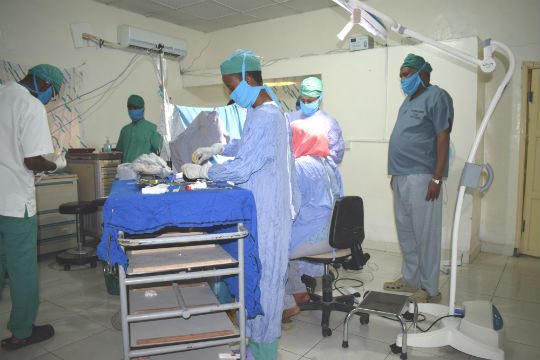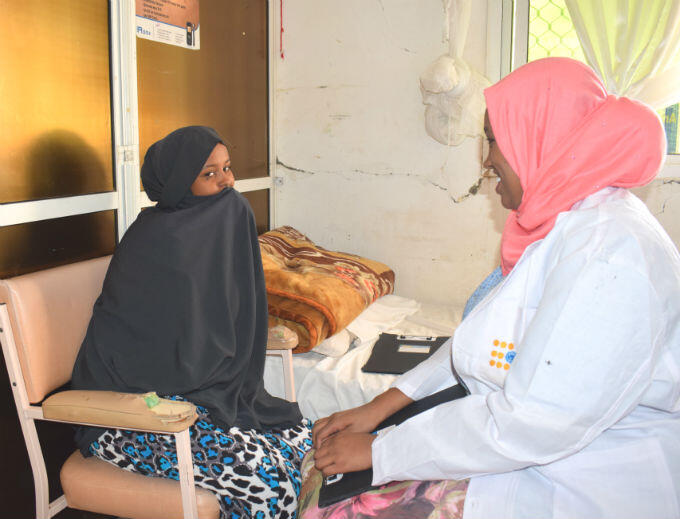Canab Salad, 17, from Howlwadaag in Puntland is known as the girl who is possessed by demons and has been mostly living in isolation from her family and community. She had been leading a normal life before until she got pregnant at 15 when she went into labour for long hours after she suffered high blood pressure and started convulsing.
“Ms. Salad comes from a place with very limited health services and she did not receive the needed comprehensive care when she went into labour. Unfortunately, they wanted to save her life so they removed the child by force. She lost the child and immediately developed fistula. She became depressed and got divorced. Ms. Salad’s aunt told us that this is when she started having hallucinations and people started calling her the demon girl,” said Dr. Layla Mohammed Hashi, Behaviour Change Communication and Family Planning Analyst for UNFPA Somalia.
But now Ms. Salad is no longer the demon girl. She has just undergone surgery at a fistula campaign, which has been taking place at Borama Fistula Hospital in Somaliland from 18 February to 5 March 2018. The campaign was organised by the Somaliland Nursing and Midwifery Association (SLNMA) with support from UNFPA Somalia.
“Upon arrival at the hospital, Ms. Salad was diagnosed with psychosis, an abnormal condition of the mind that results in difficulties telling what is real and what is not. We decided to extend our help to her by calling Dr. Jibril Hundule who is one of the few doctors in Somaliland with psychiatric specialty to assist Ms. Salad before the fistula surgery,” said Dr. Hashi.
Ms. Salad will be going back to Puntland soon and will get reintegrated in her community, according to Dr. Hashi.

a fistula repair being conducted in Borama Hospital
Fistula is one of the most serious and tragic childbirth injuries. It is a hole between the birth canal and bladder or rectum caused by prolonged, obstructed labour, without access to timely, high-quality medical treatment. It leaves women leaking urine or faeces or both, and often leads to chronic medical problems, depression, social isolation and deepening poverty. More than two million women still live with the condition, and 50,000 to 100,000 develop fistula every year.
The campaign in Somaliland had targeted 50 women, according to Dr. Hashi.
“The fistula campaign has been organised to restore the dignity of women and girls with fistula from across Somalia and to rehabilitate and empower the survivors with skills that will see them re-integrate easily into their communities,” said Dr. Hashi.
Nuurto Ibrahim from Bay region in South Central Somalia is another girl who has benefited from the fistula campaign. She gave birth to her first-born child when she was just 15 years old. The baby died soon after birth. She got pregnant again a few months later and lost the second baby again.
“I immediately started leaking urine continuously after giving birth to the second baby. This has had a terrible effect on my emotional well being. I have had fistula for 3 years now,” Ms. Ibrahim told UNFPA.
But now Ms. Ibrahim is all smiles after undergoing surgery.

health personnel working on the fistula campaign in Borama
Another woman who has benefited from the campaign is Faay Noor, 30. She travelled a long way from Baidoa, South Central Somalia to access the services. Ms. Noor’s family is among the 250 families who were displaced by the drought in Baidoa, which had swept through all Somalia in 2017.
“I am a mother of 4 children and I developed fistula with my last pregnancy,” said Ms. Noor.
She was diagnosed with anemia and malnutrition and was weak when she had just arrived at the hospital. Ms. Noor underwent surgery to repair the fistula a week after arriving at the hospital.
“I am very excited to get back to normal life,” said Ms. Noor.
As the leader of Campaign to End Fistula, UNFPA provides strategic vision, technical guidance and support, medical supplies, training and funds for fistula prevention, treatment and social reintegration programmes. UNFPA also strengthens reproductive health care and emergency obstetric services to prevent fistula from occurring in the first place.
----------------------------------------------------------
For more information please contact UNFPA Somalia Communications Specialist Pilirani Semu-Banda on e-mail: semu-banda@unfpa.org



